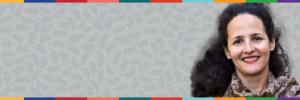
Meet SU’s 2021 Teaching Fellow: Dr Taryn Bernard
As one of Stellenbosch University's (SU) teaching fellows for the period 2021 to 2023, Dr Taryn Bernard says she is excited about the opportunities the fellowship will bring to her classroom practice and research goals.
“The Teaching Fellowship is an incredible opportunity for scholars at SU to spend some dedicated time thinking about teaching and learning at university level. I am excited about this, about breathing new life into the things I take for granted, in thinking about and experiencing things differently, in making room for new perspectives and voices and reporting on this in ways that will reach a broader academic community."
Bernard is a senior lecturer on the Extended Degree Programme (EDP) in the Faculty of Arts and Social Sciences where she teaches academic English to a group of multicultural and multilingual students. She has been teaching for over a decade and in 2019 she received an SU Teaching Award in the Distinguished Category.
She has a background in applied linguistics, particularly methods of critical applied linguistics. These methods have influenced her pedagogical practices as well as her research. Bernard has used these methods to investigate the language of corporate social responsibility, media representations of Marikana and the complexities of a transforming higher education system.
She has previously merged critical methods of applied linguistics with ethnography to shed different light on “the language issue" at South African universities. The Teaching Fellowship will allow her to continue along the same lines, to engage in an ethnographic project that will use a diverse range of methodologies to “follow" a group of students as they navigate their way through the university system for a period of three years. Particular attention will be paid to language and literacy, and, in drawing on the (critical) tools in which she is well-versed, an analysis of the data will be conducted in such a way so as to shed light on issues of agency and power.
Bernard's ultimate goal is to use these insights to adapt her curricula and classroom practice, but she is also excited to share her findings with the broader community and in a way that can contribute to the important project of creating an environment that feels welcoming, stimulating and progressive.
“For many years now, and particularly after the #FeesMustFall protests, transformation has been high up on the agenda. Unfortunately, transformation has not yet been achieved and there are many students who feel alienated, who do not feel at home on South African campuses. In collecting the type of data I aim to collect, and in analysing it against the backdrop of theoretical understandings of 'space', my hope is that the project will really capture the experiences of a particular group of students in ways that will contribute to the transformation agenda. If higher education is thought of as a public good, as it so often is, truly transforming the higher education sector will have a direct benefit for society."
Bernard's research project will take place over three years and will ultimately be a sociolinguistic and ethnographic project. She will be putting a lot of emphasis on language and culture, and says she will be thinking a lot about her own culture, the culture of the students who choose to be part of the research project, the culture of the institution and the languages and dialects that circulate this space and how they are perceived and used.
“I'll be using innovative and arts-based methods to do this and asking participants to reflect on the artefacts they select to submit. In doing so, I will be able to gain enormous insight into the experiences of a group of multilingual students as they navigate their way through the higher education system. There is still so much to learn about diversity and resilience, and so much of this can only be found in the stories students tell about themselves and their worlds.
“I believe the research will also in the end highlight the value of qualitative research, a type of research than isn't supposed to be generalizable but can nevertheless assist in untangling and understanding complexity. There is so much complexity in the South African higher education system and so much that still needs to be understood."
More on the SU Teaching Fellowship
Stellenbosch University initiated teaching fellowships in 2009 to provide an opportunity for selected academics to develop their teaching expertise and stimulate the growth of the scholarship of teaching and learning at the University. The fellowships provide excellent teachers and scholars of teaching and learning with the opportunity to spend a consistent period of time (between one and three years), with various forms of support, to focus on aspects of curriculum renewal, exploring teaching and learning and disseminating good teaching and learning practice in departments and faculties.
The fellowships are funded by the University Capacity Development Grants. SU has awarded 13 fellowships since the inception of the programme in 2009. Four academics received a Teaching Fellowship for the period 2021 to 2023. They include, Dr Taryn Bernard (Extended Degree Programme, Faculty of Arts and Social Sciences), Prof Debby Blaine (Department of Mechanical and Mechatronic Engineering, Faculty of Engineering), Dr Gretha Steenkamp (School of Accountancy, Faculty of Economic and Management Sciences) and Prof Susan van Schalkwyk (Director: Centre for Health Professions Education, Faculty of Medicine and Health Sciences).
For more information, please contact Dr Karin Cattell-Holden, [email protected].
